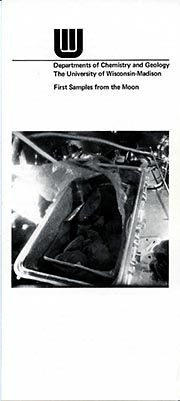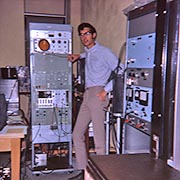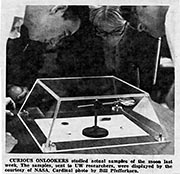Old Retired Guy Blog

September 9, 2009 |
Apollo 11
The recent 40th anniversary of the Apollo 11 mission and the first landing on the moon brought back fond memories for me. Two scientists at the University of Wisconsin-Madison were principle investigators for NASA back then. Dr. Eugene Cameron's group in the Department of Geology studied the mineralogy of the lunar rocks and Dr. Larry A. Haskin's group in the Department of Chemistry studied the trace element composition of the lunar material. Many of the chemical analyses on the lunar samples were carried out by Ralph Allen, Phil Helmke, and other doctoral students working with Dr. Haskin. I had the good fortune of working with Dr. Haskin and Ralph Allen when I was an undergraduate in the Chemistry Department in 1968 - 1970. I spent many hours in the Chemistry building preparing and analyzing the lunar samples. The photo above shows me with one of the analyzers that we used to carry out Neutron Activation Analyses on the lunar fines.
So, where are these chemists now? You know where I am. Dr. Ralph Allen is currently a Professor in the Department of Chemistry at the University of Virginia in Charlottesville and Dr. Phil Helmke is a Professor in the Department of Soil Science at the UW-Madison. Dr. Haskin was with the UW Department of Chemistry from 1960-1973 before going to Houston where he headed up the Planetary and Earth Sciences Division of the NASA Johnson Space Center. He later moved to Washington University in St. Louis where he became a professor and eventually the Chair of the Department of Earth and Planetary Sciences. Dr. Haskin passed away in 2005. Having come of age during the space race, I am quite proud of the fact that I worked on lunar samples from both Apollo 11 and Apollo 12 while I attended UW-Madison.
End of 'Apollo 11' Entry |



 [I should have written this almost two months ago but I didn't
find the time to do it then. It's still current enough I guess.]
[I should have written this almost two months ago but I didn't
find the time to do it then. It's still current enough I guess.] When
the lunar samples first arrived in Madison they were put on public display in
the Chemistry Building. The cover of the brochure that we handed out is
shown in the left-hand column. You can click on this photo if you want to
download and read a PDF version of the brochure. A photo that appeared in
the Daily Cardinal, the student newspaper, is shown at the right.
When
the lunar samples first arrived in Madison they were put on public display in
the Chemistry Building. The cover of the brochure that we handed out is
shown in the left-hand column. You can click on this photo if you want to
download and read a PDF version of the brochure. A photo that appeared in
the Daily Cardinal, the student newspaper, is shown at the right.